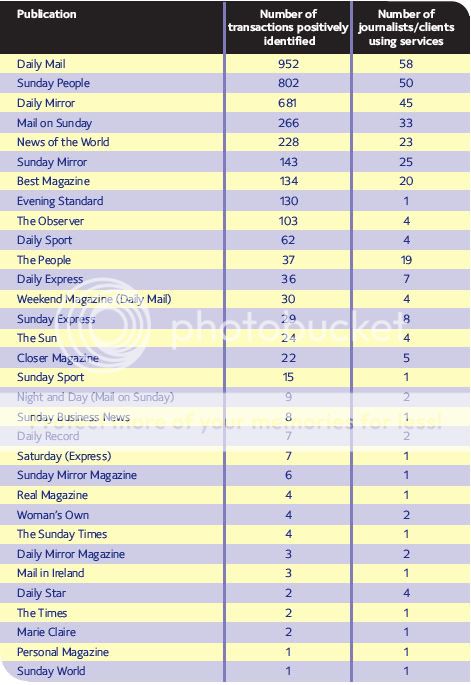
Richard Thomas, the Information Commissioner in April 2008 wrote:
"Section 55 of the Data Protection Act makes it an offence to obtain, disclose or procure the disclosure of confidential personal information knowingly and recklessly without the consent of the organisation that holds the information. In May 2006 the Information Commissioner presented a special report to Parliament – What Price Privacy?
The report documented at length how this illicit market works and – from material seized under search warrant powers by the Information Commissioner – included a tariff of prices charged for obtaining confidential telephone (£75-750), criminal (£500), vehicle (£150-200) and other records. The report also indicated that 305 journalists had been identified in the documents seized. Documents seized from one tracing agent working for finance houses revealed one agent invoicing for up to £120,000 a month for positive traces.
The report demonstrated that – although this has been a criminal offence for many years – the current penalty regime is too weak, often resulting in a derisory fine or conditional discharge which has not succeeded in stemming this illegal activity. Fundamentally the low penalties devalue the offence, mask the true seriousness of the crime and fail to have any significant deterrent effect. The main recommendation of the report was the introduction of a possible two year prison sentence for those convicted of committing the Section 55 offence.
In December 2006 the Information Commissioner presented a follow up report to
Parliament detailing the progress made. There had been widespread support for the
Commissioner’s proposals and the high profile case of the interception of phone messages of the Royal Family with strong comparisons to the Data Protection Offence highlighted the need for a strong deterrent and greater awareness. The report also identified the publications that the 305 journalists who had been mentioned in the last report were working for. In particular the Information Commissioner welcomed the Government’s recognition that the current penalties are too low and had launched a formal consultation exercise on raising the maximum penalty to include prison sentences. Further to that consultation the Government included Clause 76 in the Criminal Justice and Immigration Bill to bring this reform into effect...
The need for tough sanctions has increased substantially since What Price Privacy?, the Government’s consultation exercise and consideration by Select Committees. The loss of 25 million records by HMRC (including some 7 million bank details) has focused on the substantial financial risks of identity theft. But this has also brought home the massive attraction to criminals able to obtain personal data of this nature. More than ever we need to deter those attempting to secure data illicitly and insiders who may be tempted to disclose by demonstrating the seriousness of the offence...
There have been concerns from some sections of the press that a custodial sentence would have a “chilling effect” on investigative journalism. Representations against the measure from media organisations have not been convincing. In effect, they are arguing against a criminal offence which has been on the statute book for many years. They object to tougher sanctions against activities which they say do not exist or are not widespread. But the louder the protests against stronger penalties, the more they suggest questionable practices. The offence is only committed when there is deliberate or reckless disclosure of personal data without the consent of the organisation which holds it.
The implication of their case is that they wish to be able to break the law. No new criminal offence is being created and there is already a defence for journalists whose activities can be justified as being in the public interest. But they should be aware of the offence and think carefully before seeking to obtain personal information which is known to be clearly confidential. As well as the explicit public interest defence, genuine investigative journalism will be protected by the Statement of Prosecution Policy which the Information Commissioner intends to adopt which recognises the need to consider the public interest in bringing a prosecution. In his speech on Liberty on 25 October 2007, the Prime Minister acknowledged the concerns expressed in media circles, but made clear that he was not convinced by them.
He stated that:
“Clear guidance will make sure that legitimate investigative journalism is not
impeded but the sanctions provide a strong deterrent to protect personal
privacy.”
...Nevertheless the Information Commissioner continues to see evidence of the existence of an illegal trade in personal information and is investigating and prosecuting offences under Section 55 of the Act. Ongoing investigations involve information held by government departments, telecommunications companies, financial institutions and health trusts.
...Failure to respect an individual’s privacy can lead to real distress and in some
circumstances mental, physical and financial damage. At a time of increased information sharing it is essential that information is kept secure and that individuals trust that their privacy will be properly protected. Recent high profile security breaches in the public and private sectors have increased awareness of the importance of data protection amongst the public and will also have impacted upon the confidence they have in organisations respecting their privacy."
Full text: http://bit.ly/bkQt9m

Related:
Information Commissioner's Response to Ministry of Justice.pdf: http://bit.ly/cZKQf2
What-Do-They-Know pdf ledgers obtained under FOI: The Operation Motorman Ledgers - WhatDoTheyKnow
Met chief ‘misled Parliament over phone-hacking scandal’ Met chief ‘misled Parliament over phone-hacking scandal’ | News
Reporter quizzed over phone hacks: Reporter quizzed over phone hacks - Doncaster Today
Data Mining: The 21st Century Gold Rush: Data Mining: The 21st Century Gold Rush | The Urban Times
Guardian:
Operation Motorman: the full story revealed Operation Motorman: the full story revealed | Media | The Guardian
Phone-hacking scandal: Sienna Miller set to join legal action Phone-hacking scandal: Sienna Miller set to join legal action | Media | The Guardian
News of the World may face torrent of litigation over phone hacking News of the World may face torrent of litigation over phone hacking | Media | The Guardian
BBC:
Phone hacking: MPs to probe contempt of Parliament BBC News - Phone hacking: MPs to probe contempt of Parliament
Bloomberg:
London Metropolitan Police Sued Over Probe of Murdoch Paper Wire-Tapping London Metropolitan Police Sued Over Probe of Murdoch Paper Wire-Tapping - Bloomberg
